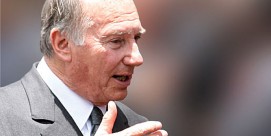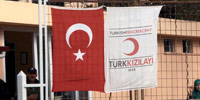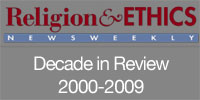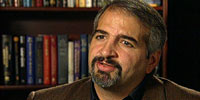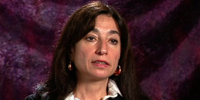In This Episode << SLIDE LEFT TO SEE ADDITIONAL SEGMENTS
Dr. Phebe Marr
Read more of Bob Abernethy’s interview with Dr. Phebe Marr, an Arabist and leading specialist on Iraq, about religion and politics in post-war Iraq and the origins of the split between Shii and Sunni Muslims:
It began as a political split that became a theological and religious split. It originated in a problem of succession after the death of the Prophet Muhammad. Ali, his cousin and son-in-law, was passed over for the successor, known as the caliph, and thought he should have had it. Eventually he was killed, and his followers made the claim that the succession should adhere in his family. It shouldn’t be elected or selected; it should have been in the family of the Prophet and the descendants of Ali. This separated the two groups and has ever since.
In fact, most of the Shiis today trace their religion back to a succession of 12 imams who were descendants of Ali. The 12th disappeared, never to be seen again. He’s considered the Mahdi [a messianic figure expected to usher in an era of peace and justice]. They’re waiting for his return.
The Shiis then became an opposition [group] in the Islamic world, because the Sunnis dominated almost all governments since then. And in fact there’s an interesting psychological parallel here. As the opposition, they went underground. Many of them developed esoteric ideas and philosophy. But the Shiis have always considered themselves an opposition to state power.
In Iran, a majority Shii country, that’s not true. But almost everywhere else you find the Shiis a minority. They developed a psychology of alienation from state power and victimization. You can definitely see that in the case in Iraq as well.
The Shiis want power but they haven’t had it. As in the rest of the Islamic world in history, they have developed certain ideas — they’ve always been in opposition to the state, rather than participating. They don’t want to go along with it; they don’t want to enter the state. Opposition tends to feed on itself as well.
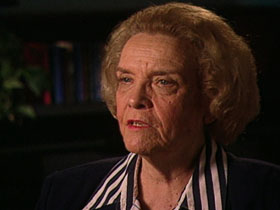
Being in opposition has played a role in Iraqi history. When the British came in under the mandate and Sunnis dominated the government, the Shiis tended to be more anti-British, more independence-minded, and they refused to participate in the government. It’s not only that they weren’t in the government, but they didn’t want to get their hands dirty, they didn’t want to be tainted, they took a position of opposition. The result was that they didn’t play a role. The Sunni classes and others perpetuated their power.
Shiis today have learned that lesson. And, in fact, at a number of meetings of Shiis that have been held, they cite this as one of the biggest tactical mistakes they made — to except themselves, to put themselves out of the government. They should put themselves in it, push to play a role and not play this holier-than-thou opposition. You’re not going to see that again.
In every government there have been some Shiis. And there have been some political parties where they have been a majority. The percentage of Shiis in government has gone up and down depending on circumstances, but certainly Shiis have played a role in Iraqi governments.
Shii means “partisan” or “party.” That tells you this was originally a political rather than a religious split. Shii actually meant “the party of Ali” — those people in the early days of the caliphate who supported him. Then everybody dropped “Ali,” and they became known as Shiis.
These differences are subtle, but I think they’re real. Sunni comes from the word meaning custom or practice of the Prophet laid out after his death and embodied in Islamic law. The Sunnis follow the law, and the Shii follow the leader. Because of the development of their theology and the apparent authority vested in their scholars, they follow their mujtahid, who have more ability to interpret the law.
Among the Sunni leaders, the clergy, scholars and legalists really don’t have any particular, special leadership over the people. In Shii Islam, the leadership principle is much stronger. All Shiis have to follow one or another theologian or cleric. This is part of their theology that gives the clergy in Shii Islam a much higher degree of power over their followers than Sunnis.
Actually, the religious differences [between Shiis and Sunnis], while there, (how to practice your religion, the business of following clergy, etc.) are not very great. That is not what divides the two communities in Iraq. Essentially it’s a political difference. The two communities get along fairly well. There’s a certain amount of intermarriage. But throughout much of their modern history it’s been Sunnis who have governed. They have had the dominant positions in the state.
Arab Sunnis constitute about 15 to 20 percent of the population [of Iraq]. Kurds who are predominantly Sunni constitute maybe another 17 percent. And the Shiis are unquestionably the majority — 55 to 60 percent. Not surprisingly, they resent a government dominated by another group and want a government in which they are adequately represented, which in fact would probably give them a majority of the seats.
The role the Shiis play in government is going to be a very dominant one. Unless some kind of government comes in which they have adequate representation, there really will not be stability.
[Protecting sacred Muslim sites in Iraq] is absolutely critical. Should anything happen to these sites it could stir up a lot of animosity. So we’re going to have to be very careful. And in fact we should be in touch with religious leaders because they have quite a bit of influence over most of the population (not everybody is religious), and we need to get them on our side.
It’s very unlikely that [Shii religious leaders] would play a direct political role [in post-war Iraq]. There are divisions among these religious leaders as well. Some don’t believe in participation in politics. They’re called “quietists.” They stay home and take care of religion.
Others like Khomeni, as seen in Iran, believe in direct participation. But we mustn’t think of all of the Shiis as profoundly religious. A certain percentage of them, of course, are religious and might like to have an Islamic state. There’s a political party of Islamic Iraqi exiles in Iran who would like that. But it’s not clear to me and many people what percentage of the Shiite population would vote for that in a free election. I’m presuming that it wouldn’t be a majority. The Shiis are a diverse population with many secularists, many people who aren’t very religious, a very substantial educated middle-class population, many people who would just normally practice their religion but don’t want to see religious leaders. It’s very diverse.
A future Iraq should be a secular state that separates religion and politics. That is going to be absolutely essential in Iraq because the population is so evenly divided between Sunni and Shii. If you try to impose one or the other on the other community, it’s going to be unstable. There should be freedom of religion. Both communities should be able to practice their religion as they wish. But the government must represent Iraq. It must be some kind of a process which brings both groups into the government on the basis of some kind of political program, not a religious program.
In fact, [the people of Iraq] never had religious government. They’ve had a series of rather poor governments. Under the mandate they had the faade of democratic institutions, parliament and so on. But it was not on a religious basis. Under the revolutionary military regimes they got authoritarian military leaders. But none of these have been religious in their base.
A government can only work if a constitutional process is instituted. That’s, of course, easier said than done. But they’re going to have to put in a rule of law that protects religious freedom. They’re going to have to get a constitutional process in which eventually various groups in Iraq are represented. The government is going to be Iraqi, primarily secular, in which there’s going to be a separation between religion and state. And, indeed, if you have a representative government, the Shiis themselves will probably have the majority of seats.
We mustn’t think of the Shiis as homogeneous or the Sunnis as homogeneous. They’re not going to come into power for the most part as Shiis. They’re going to come in as Iraqis. We talk all the time about Shii and Sunni and Kurd. This upsets Iraqis because they do think of themselves as Iraqi first, and that’s what’s got to be encouraged — Iraqi first, secondarily something else: Kurdish, Turkomen, Arab, Shia, Sunni.
[There] is not a religious split in Iraq. I will say that definitively. Of course, there are some religious differences. But this is not what’s driving the problem. What’s driving the problem is governmental — the fact that this particular government is dominated by Sunnis and not even all Sunnis, but Sunnis of a particular group and class, and it has excluded Shiis from major decision-making positions. Needless to say, that has encouraged Shii identity, Shii opposition, Shii separateness. There’s more thinking about being Shii today than there was, say, twenty years ago. It’s a government problem.
In the new government, whatever it is, the Shiis are going to want a much greater say. But that doesn’t necessarily mean a religious say [or] that they’re going to want religious leaders or any particular Shiis representing them. But when they look at the composition of the government, they’re going to want to see Shiis there. They’re not going to follow the same tactics they did earlier. In any new Iraqi government, as Iraqis they’re going to insist on playing a role.
This is a horrible dictatorship. But Shiis, Sunnis, Kurds and Arabs have been participating in Iraqi governments since its founding. The question is what percentage? Iraq is a very secular country. It’s one of the most secular countries in the Middle East. It is true there’s something of a religious revival today, and there’s a little bit more religion in Iraq than there has been. But they’re used to a secular government. What they want is an Iraqi government which, in fact, plays down these differences between Shii and Sunni and even ethnic differences. It is going to be more difficult, frankly, to absorb the Kurds because they speak a different language, and they have a little bit more sense of wanting a separate self-governing mechanism.
The Shiis are not separatists at all. They consider themselves to be Iraqis. That they can’t get along — this is really not an issue in Iraq. They’ve been getting along for some time. The question is who is going to dominate the government? Are you going to have a government in which one particular group, which is a minority, has all the decision-making positions whereas the majority only shows up as a minority in the government? That’s the main issue.

